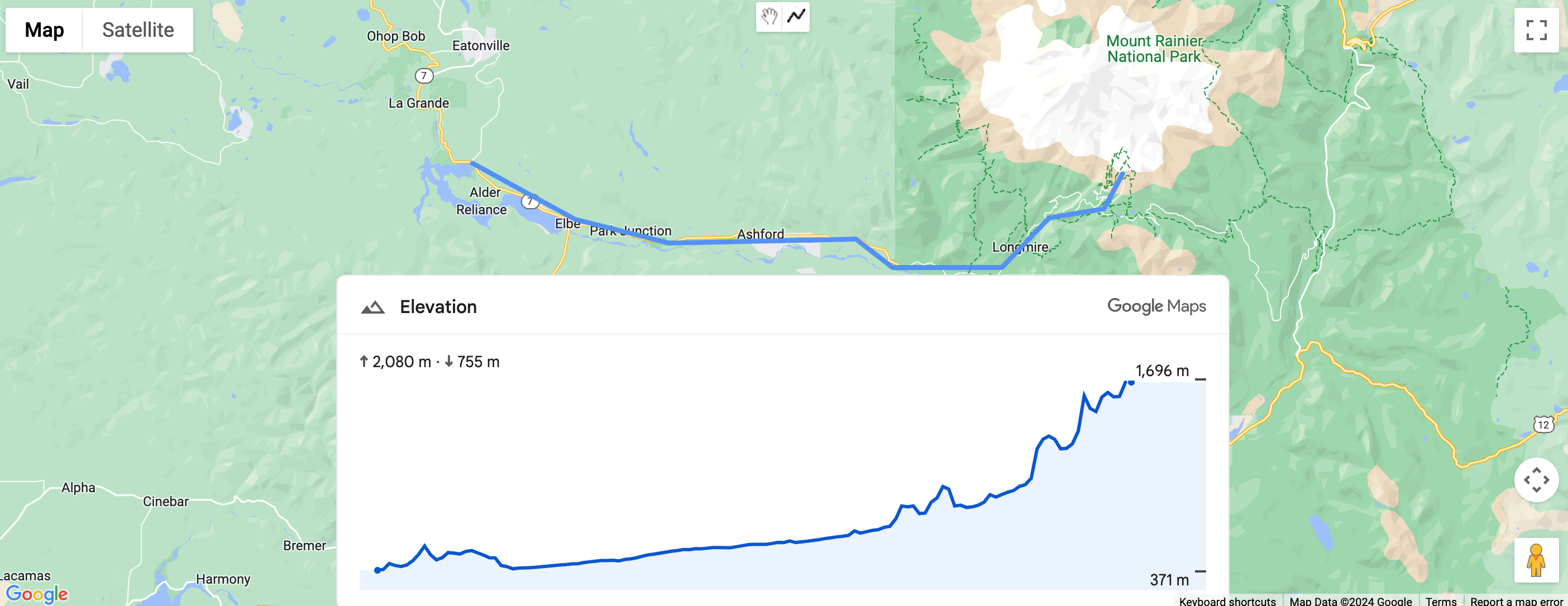
ElevationElement هو عنصر HTML يعرض بشكل مرئي بيانات الارتفاع لنقطة واحدة أو خط متعدّد الأضلاع. تعرض هذه السمة رسمًا بيانيًا للارتفاع على طول المسار المحدّد في السمة
path مع مجموعة من إحداثيات خطوط الطول والعرض. يتم استيفاء القطع المستقيمة بين نقاط المصفوفة، لذا حتى عدد صغير من النقاط سيؤدي إلى إنشاء رسم بياني تفصيلي للارتفاع.
ضبط ارتفاع المسار باستخدام الإحداثيات
يعرض المثال التالي ارتفاع مسار بين نقطتَين تم اختيارهما من خلال مجموعة من الإحداثيات، وذلك باستخدام عنصر gmp-elevation.
يتم ضبط العنصر لقياس المقاييس باستخدام السمة
unit-system:
<gmp-elevation unit-system="metric"></gmp-elevation>
يتم استخدام querySelector لاختيار عنصر الارتفاع وضبط السمة path باستخدام إحداثيات خطوط الطول والعرض:
/** Maps JS loaded callback */ async function init() { // Load the Elevation Element from Maps JS const {ElevationElement} = await google.maps.importLibrary('elevation'); // Specify an elevation path to render const elevationElement = document.querySelector('gmp-elevation'); elevationElement.path = [ {lat: 37.4523, lng: -122.2645}, {lat: 37.377, lng: -122.4078}, ]; }
الاطّلاع على مثال الرمز البرمجي الكامل
JavaScript
/** Maps JS loaded callback */ async function init() { // Load the Elevation Element from Maps JS const {ElevationElement} = await google.maps.importLibrary('elevation'); // Specify an elevation path to render const elevationElement = document.querySelector('gmp-elevation'); elevationElement.path = [ {lat: 37.4523, lng: -122.2645}, {lat: 37.377, lng: -122.4078}, ]; } init();
CSS
html, body { margin: 0; padding: 0; } gmp-elevation { width: 100%; height: 100%; } .overlay { margin: 20px; width: 400px; }
HTML
<!DOCTYPE html>
<html>
<head>
<title>Simple Elevation</title>
<meta charset="utf-8">
<link rel="stylesheet" type="text/css" href="style.css">
</head>
<body>
<h1>Path elevation</h1>
<div class="overlay">
<gmp-elevation unit-system="metric"></gmp-elevation>
</div>
<script>
(g=>{var h,a,k,p="The Google Maps JavaScript API",c="google",l="importLibrary",q="__ib__",m=document,b=window;b=b[c]||(b[c]={});var d=b.maps||(b.maps={}),r=new Set,e=new URLSearchParams,u=()=>h||(h=new Promise(async(f,n)=>{await (a=m.createElement("script"));e.set("libraries",[...r]+"");for(k in g)e.set(k.replace(/[A-Z]/g,t=>"_"+t[0].toLowerCase()),g[k]);e.set("callback",c+".maps."+q);a.src=`https://maps.${c}apis.com/maps/api/js?`+e;d[q]=f;a.onerror=()=>h=n(Error(p+" could not load."));a.nonce=m.querySelector("script[nonce]")?.nonce||"";m.head.append(a)}));d[l]?console.warn(p+" only loads once. Ignoring:",g):d[l]=(f,...n)=>r.add(f)&&u().then(()=>d[l](f,...n))})({
key: "YOUR_API_KEY",
v: "alpha"
});
</script>
</body>
</html>ضبط ارتفاع المسار باستخدام خط متعدد الأضلاع
يعرض المثال التالي ارتفاع مسار استنادًا إلى خط متعدد الأضلاع يرسمه المستخدم. تحصل على
path من الخط المتعدد الخاص بالمستخدم باستخدام polyline.getPath().getArray():
elevationElem.path = polyline.getPath().getArray();
الاطّلاع على مثال الرمز البرمجي الكامل
JavaScript
const map = document.querySelector('gmp-map'); const elevationElem = document.querySelector('gmp-elevation'); async function init() { await google.maps.importLibrary('places'); await google.maps.importLibrary('marker'); await google.maps.importLibrary('elevation'); map.innerMap.setOptions({'mapTypeControl': true, 'clickableIcons': false}); findCurrentLocation(); drawPolyline(); } async function drawPolyline() { const {DrawingManager} = await google.maps.importLibrary('drawing'); const drawingManager = new DrawingManager({ drawingMode: google.maps.drawing.OverlayType.POLYLINE, drawingControl: true, drawingControlOptions: { position: google.maps.ControlPosition.TOP_CENTER, drawingModes: [google.maps.drawing.OverlayType.POLYLINE] }, polylineOptions: {geodesic: true, strokeColor: '#5491f5', strokeWeight: 6} }); drawingManager.setMap(map.innerMap); drawingManager.addListener('polylinecomplete', (polyline) => { console.log('complete'); console.log(polyline.getPath().getArray()); elevationElem.path = polyline.getPath().getArray(); polyline.addListener('click', (e) => { console.log(e); }); }); } async function findCurrentLocation() { const {LatLng} = await google.maps.importLibrary('core'); if (navigator.geolocation) { navigator.geolocation.getCurrentPosition( (position) => { const pos = new LatLng(position.coords.latitude, position.coords.longitude); map.innerMap.panTo(pos); map.innerMap.setZoom(16); }, () => { console.log('The Geolocation service failed.'); map.innerMap.setZoom(16); }, ); } else { console.log(`Your browser doesn't support geolocation`); map.innerMap.setZoom(16); } } init();
CSS
html, body { height: 100%; margin: 0; } body { display: flex; flex-direction: column; font-family: Arial, Helvetica, sans-serif; } h1 { font-size: 16px; text-align: center; } gmp-map { box-sizing: border-box; margin-top: 20px; width: 100%; height: 100%; } gmp-elevation { width: 100%; height: 300px; } .overlay { width: 800px; }
HTML
<!DOCTYPE html>
<html>
<head>
<title>Path Elevation</title>
<meta charset="utf-8">
<link rel="stylesheet" type="text/css" href="style.css">
</head>
<body>
<h1>Draw polyline and get path elevation</h1>
<gmp-map center="-37.813,144.963" zoom="12" map-id="DEMO_MAP_ID">
<div id="elevation-container" class="overlay" slot="control-block-end-inline-center">
<gmp-elevation unit-system="metric"></gmp-elevation>
</div>
</gmp-map>
<script>
(g=>{var h,a,k,p="The Google Maps JavaScript API",c="google",l="importLibrary",q="__ib__",m=document,b=window;b=b[c]||(b[c]={});var d=b.maps||(b.maps={}),r=new Set,e=new URLSearchParams,u=()=>h||(h=new Promise(async(f,n)=>{await (a=m.createElement("script"));e.set("libraries",[...r]+"");for(k in g)e.set(k.replace(/[A-Z]/g,t=>"_"+t[0].toLowerCase()),g[k]);e.set("callback",c+".maps."+q);a.src=`https://maps.${c}apis.com/maps/api/js?`+e;d[q]=f;a.onerror=()=>h=n(Error(p+" could not load."));a.nonce=m.querySelector("script[nonce]")?.nonce||"";m.head.append(a)}));d[l]?console.warn(p+" only loads once. Ignoring:",g):d[l]=(f,...n)=>r.add(f)&&u().then(()=>d[l](f,...n))})({
key: "YOUR_API_KEY",
v: "alpha"
});
</script>
</body>
</html>
